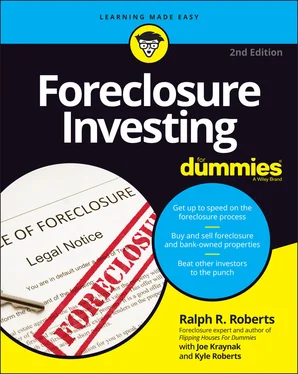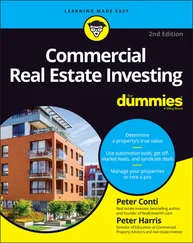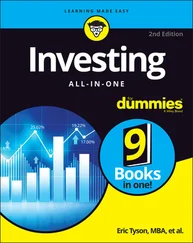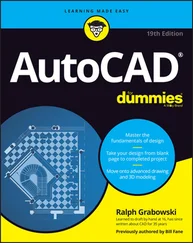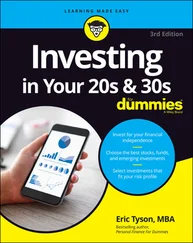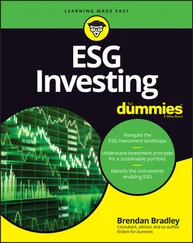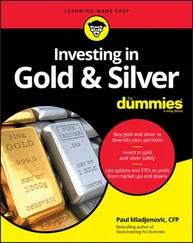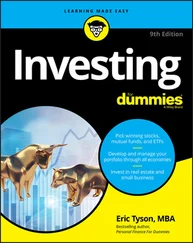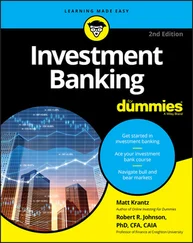Ralph R. Roberts - Foreclosure Investing For Dummies
Здесь есть возможность читать онлайн «Ralph R. Roberts - Foreclosure Investing For Dummies» — ознакомительный отрывок электронной книги совершенно бесплатно, а после прочтения отрывка купить полную версию. В некоторых случаях можно слушать аудио, скачать через торрент в формате fb2 и присутствует краткое содержание. Жанр: unrecognised, на английском языке. Описание произведения, (предисловие) а так же отзывы посетителей доступны на портале библиотеки ЛибКат.
- Название:Foreclosure Investing For Dummies
- Автор:
- Жанр:
- Год:неизвестен
- ISBN:нет данных
- Рейтинг книги:5 / 5. Голосов: 1
-
Избранное:Добавить в избранное
- Отзывы:
-
Ваша оценка:
- 100
- 1
- 2
- 3
- 4
- 5
Foreclosure Investing For Dummies: краткое содержание, описание и аннотация
Предлагаем к чтению аннотацию, описание, краткое содержание или предисловие (зависит от того, что написал сам автор книги «Foreclosure Investing For Dummies»). Если вы не нашли необходимую информацию о книге — напишите в комментариях, мы постараемся отыскать её.
Foreclosure Investing For Dummies,
Foreclosure Investing For Dummies,
Foreclosure Investing For Dummies — читать онлайн ознакомительный отрывок
Ниже представлен текст книги, разбитый по страницам. Система сохранения места последней прочитанной страницы, позволяет с удобством читать онлайн бесплатно книгу «Foreclosure Investing For Dummies», без необходимости каждый раз заново искать на чём Вы остановились. Поставьте закладку, и сможете в любой момент перейти на страницу, на которой закончили чтение.
Интервал:
Закладка:
 Keep track of properties from the day they’re advertised to the time they’re sold. Very often, a particular foreclosure sale is adjourned, so the property doesn’t go up for auction on the scheduled day. By following the adjournments, you often find that the property goes up for sale later. If you’re prepared, you may be able to grab the property without facing any competing bids.
Keep track of properties from the day they’re advertised to the time they’re sold. Very often, a particular foreclosure sale is adjourned, so the property doesn’t go up for auction on the scheduled day. By following the adjournments, you often find that the property goes up for sale later. If you’re prepared, you may be able to grab the property without facing any competing bids.
Weighing the drawbacks of waiting for the foreclosure notice
Although the posting of the foreclosure notice delivers some valuable benefits to foreclosure investors, it also heats up competition among investors, all of whom are looking for the best deal. As soon as that foreclosure notice is published, every foreclosure investor working the pre-auction circuit catches the scent and heads out to research the property and contact the homeowners.
 When you’re buying properties from distressed homeowners pre-auction, finding out about prospective foreclosure properties before the posting of the notice often gives you a competitive edge. Networking (discussed in Chapter 6) provides the earliest leads. Reading the notices as soon as they’re posted and acting quickly to contact the homeowners is the next-best option.
When you’re buying properties from distressed homeowners pre-auction, finding out about prospective foreclosure properties before the posting of the notice often gives you a competitive edge. Networking (discussed in Chapter 6) provides the earliest leads. Reading the notices as soon as they’re posted and acting quickly to contact the homeowners is the next-best option.
Wrapping up your deal before the sale
Buying a property from the homeowners before the sale is a standard seller-to-buyer transaction. If you’ve ever bought a house (and you should be a homeowner if you’re investing in real estate), you know the drill:
1 Present your offer to the homeowners in the form of a purchase agreement.You may need to work through a series of counteroffers to agree on a price and terms.
2 Have the property professionally inspected.
3 Order title insurance to protect yourself if the title has any hidden claims against it.
4 Sign the papers at closing.
5 Take possession of the property on the agreed-upon date.
 Because you purchased the property directly from the homeowners, they have no right of redemption, so you don’t have to wait around for several months. You can move into the property immediately, renovate and sell it, or turn it into a rental unit. See Part 5for details on profiting from a property after you take possession of it.
Because you purchased the property directly from the homeowners, they have no right of redemption, so you don’t have to wait around for several months. You can move into the property immediately, renovate and sell it, or turn it into a rental unit. See Part 5for details on profiting from a property after you take possession of it.
Bidding for a Property at a Foreclosure Auction
Foreclosure investors often choose to do their bidding at auctions. A common misconception about foreclosure auctions is that investors bid on properties. The truth is that investors bid on mortgages (also called liens ). What’s the difference? When you buy a property from homeowners, you own the property. When you buy a lien at a foreclosure sale, you may or may not eventually take possession of the property; if your area has a redemption period, the homeowners or someone else who has a legal claim to the property can redeem it. Check the appendix at the back of this book, and consult your county’s Register of Deeds office to find out more about the redemption period in your state.
For a better understanding of what you’re actually buying at a foreclosure auction, brush up on the following types of liens:
Senior lien: The senior lien, or first mortgage, is the loan that the homeowners took out to purchase the property. I recommend that novice investors always buy first mortgages, because owning the senior lien gives you the best opportunity to take possession of the property eventually.
Junior lien: The junior lien is any other loan the homeowners took out, using their home as collateral. A junior lien is usually a second mortgage, but it can be a home-equity loan, line of credit, or contractor financing provided for home improvements. Junior liens are often wiped off the books during the foreclosure process, so they can be very risky investments.
Tax lien: A tax lien is a claim against the property for unpaid tax bills. Unlike junior liens, which foreclosure typically erases, a tax lien remains in place after foreclosure. If the tax lien is for overdue property taxes, the buyer must pay the taxes. If the lien is for income taxes, the Internal Revenue Service or other taxing agency may choose to forgive the taxes, but make sure that the foreclosing attorney notifies the IRS, as explained in Chapter 11. Buying a property tax lien is usually a safe investment, because if someone else purchases the property, you stand to get your money back and perhaps even earn a small profit. For more about profiting from tax liens, see Chapter 15.
 Don’t bid at auctions until you fully understand the process and know what you’re buying. Whenever a foreclosure guru stages a foreclosure seminar in my area, my office begins receiving calls from angry novice investors who purchased junior liens, thinking that they were buying senior liens. One investor purchased more than $100,000 in junior liens only to find out later that those liens were useless pieces of paper. Chapter 11shows you how to prepare for an auction so that you know what you’re bidding for before you place your bid.
Don’t bid at auctions until you fully understand the process and know what you’re buying. Whenever a foreclosure guru stages a foreclosure seminar in my area, my office begins receiving calls from angry novice investors who purchased junior liens, thinking that they were buying senior liens. One investor purchased more than $100,000 in junior liens only to find out later that those liens were useless pieces of paper. Chapter 11shows you how to prepare for an auction so that you know what you’re bidding for before you place your bid.
STANDING AFAR FROM THE MADDENING CROWD
I always recommend that first-time foreclosure investors sit in on at least five auctions before bidding. When you begin sitting in on auctions, you’re likely to notice the same people showing up week after week, a majority of whom never bid on properties. Some people attend for the entertainment value, and that’s fine, but others consider themselves to be the resident foreclosure experts. A new face in the crowd draws their attention, and they offer what they’re convinced is solid investment advice.
Steer clear of these foreclosure-investor phonies. The people you want to seek advice from are the people who show up every week, bid on properties, buy them, and turn them over for a profit. Unfortunately, these knowledgeable people aren’t likely to share their wisdom with a novice investor who’s looking to compete with them. But if you can earn their trust and offer something of value in exchange, they may be willing to pass along some advice.
Weighing the pros and cons of buying at auctions
The foreclosure auction provides you an opportunity to purchase a controlling interest in a property without having to deal directly with the homeowners in often-uncomfortable situations. In a way, the auction simplifies the process of acquiring properties. You show up, submit the winning bid, and walk away with the sheriff’s deed.
Buying at auction, however, presents several additional challenges, including the following:
You may not have the opportunity to inspect the property thoroughly, although you should at least inspect the property from the outside, as I advise in Chapter 8.
Properties are often sold as is, so you’re more likely to take possession of a property that requires costly repairs.
Cash payment is usually required at the time of purchase, so you need to show up with a cashier’s check. In some cases, you have a few hours or days to come up with the cash, but you still need ready access to cash to close on the deal.
Depending on the number of investors at the auction who actually bid on properties, you may face some stiff competition.
Читать дальшеИнтервал:
Закладка:
Похожие книги на «Foreclosure Investing For Dummies»
Представляем Вашему вниманию похожие книги на «Foreclosure Investing For Dummies» списком для выбора. Мы отобрали схожую по названию и смыслу литературу в надежде предоставить читателям больше вариантов отыскать новые, интересные, ещё непрочитанные произведения.
Обсуждение, отзывы о книге «Foreclosure Investing For Dummies» и просто собственные мнения читателей. Оставьте ваши комментарии, напишите, что Вы думаете о произведении, его смысле или главных героях. Укажите что конкретно понравилось, а что нет, и почему Вы так считаете.
